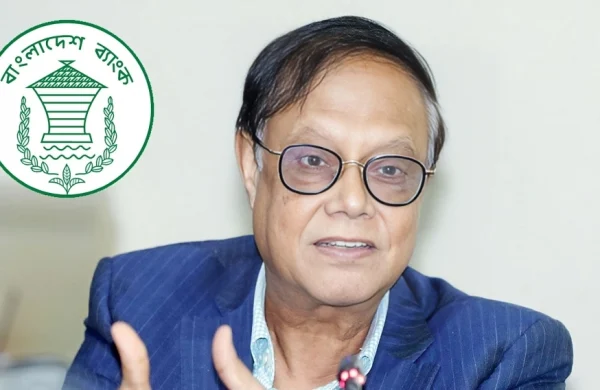Interview: Will be able to improve country’s economic situation within a year
- Update Time : Sunday, September 22, 2024

The exchange rate has stabilised at Tk120 per dollar for the
last three months, which is a positive sign
TDS Desk:
Bangladesh Bank (BB) Governor Ahsan H. Mansur has said that their primary responsibility is to bring stability to the country’s economy. This includes reducing inflation to 5-7%, stabilizing the exchange rate around Tk120 per dollar, and gradually increasing foreign exchange reserves. Additionally, he emphasised the need to clear unpaid bills and prevent any claims that Bangladesh is unable to meet its payments. He expressed confidence that the country’s economic situation would improve within a year.
In an exclusive interview, the BB Governor discussed several key issues
facing the economy and banking sector.
Question: Since you took office, the economy seems to be improving. How long will it take to achieve full stability?
Ahsan H. Mansur: The situation has largely stabilised for the general public. Now, our goal is to maintain steady progress. Bangladesh Bank’s primary responsibility is to reduce inflation, which had increased due to previous policy errors. We need to address the balance of payments instability, which has persisted for two years. I hope to transform the economy within a year.
Question: When can we expect inflation to decrease, as high inflation is severely impacting people?
Ahsan H. Mansur: I am optimistic that inflation will decrease in the coming months. Officially, our target is to reduce inflation to 7% by the end of the fiscal year, with hopes of achieving this by April or May. Afterward, we will work toward reducing it further to 6% or even 5%. Lowering inflation will allow us to reduce interest rates, which will stimulate loan demand and contribute to growth.
Question: High inflation is causing hardships for people. What are your thoughts?
Ahsan H. Mansur: Inflation is the most significant and challenging issue for ordinary people, as it widens the gap between the rich and poor. Reducing inflation to 4-5% would be a historic achievement, and we are working towards that goal. If successful, it will benefit the general population by increasing real wages and improving purchasing power.
Question: What steps do you believe are necessary to increase remittances through legal channels?
Ahsan H. Mansur: The exchange rate has stabilised at Tk120 per dollar for the last three months, which is a positive sign. Remittances sent through legal channels now offer better rates than illegal methods, something we’ve never seen before. By reducing unpaid import bills from $2 billion to $1.2 billion in just one month, we are hopeful to clear all pending bills in the next two to three months. Our reserves remain sufficient to cover three months of import expenses, and we aim to keep it that way without selling dollars in the market.
Question: How does Bangladesh Bank plan to boost private sector loans?
Ahsan H. Mansur: The government aims to borrow Tk1.37 trillion from banks, but we advised reducing this to Tk800 billion to leave room for private sector loans. If the government’s borrowing decreases, more funds will be available for private loans.
Question: What actions are being taken to recover funds laundered abroad?
Ahsan H. Mansur: Several large industrial groups have siphoned off vast sums of money abroad. We estimate that one family alone laundered around Tk1.15-1.20 trillion, with other groups involved in laundering about Tk2 trillion. We are focusing on how to recover these assets, and have already restructured several troubled banks, introducing new boards. We will evaluate each loan to ensure they are legitimate, and where necessary, pursue legal action.
Question: What are your plans for Islamic banking in Bangladesh?
Ahsan H. Mansur: We plan to establish two strong Islamic banks. Islamic Bank Bangladesh Limited will be restructured with investment from the International Finance Corporation (IFC), which will acquire 5-10% ownership. Additionally, smaller Islamic banks will be merged to form another large Shariah-compliant bank, fostering competition in the sector.
Question: There are reports of nepotism and favoritism in private banks. How will you address this?
Ahsan H. Mansur: Private banks must reject any unreasonable demands from central bank officials. If any unethical requests are made, they should report it to us, and we will take administrative action. We will not tolerate corruption, but we need cooperation from the banks.
Question: What about political influence and pressure on Bangladesh Bank?
Ahsan H. Mansur: Autonomy for the central bank is crucial. It acts as a firewall to prevent unreasonable demands from the government. We need to strengthen this autonomy and ensure that appointments to key positions, such as Governor or Deputy Governor, are made based on merit and not political influence. If we can achieve this, it will elevate the status of these positions and attract high-quality professionals. This is part of our broader reform of the central bank.
Question: What is the future of private commercial banks in Bangladesh?
Ahsan H. Mansur: We need to establish strong regulatory frameworks to prevent directors from colluding and misusing loans. Bangladesh Bank must play a more robust role to prevent any damage to the financial sector. Source: Bangladesh Pratidin














